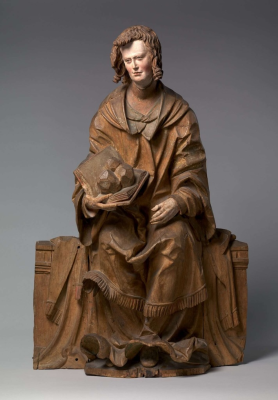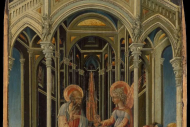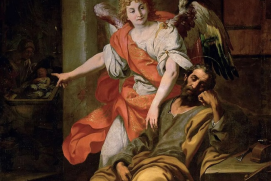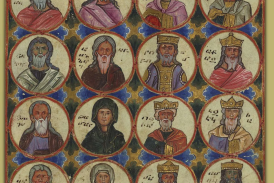Gospel in Art: Saint Stephen, the First Martyr

Saint Stephen, Sculpture by Hans Leinberger, South German,1525 © Metropolitan Museum, New York
Source: Christian Art
Gospel of 26 December 2024
Matthew 10:17-22
At that time: Jesus instructed his Apostles: 'Beware of men, for they will deliver you over to councils and flog you in their synagogues, and you will be dragged before governors and kings for my sake, to bear witness before them and the Gentiles. When they deliver you over, do not be anxious how you are to speak or what you are to say, for what you are to say will be given to you in that hour. For it is not you who speak, but the Spirit of your Father speaking through you. Brother will deliver brother over to death, and the father his child, and children will rise against parents and have them put to death, and you will be hated by all for my name's sake. But the one who endures to the end will be saved.'
Reflection on the Sculpture
Today we celebrate the Feast of St Stephen, the first Christian martyr. According to the Acts of the Apostles, Stephen was a deacon in the early Church in Jerusalem, whose teachings stirred opposition among members of the synagogues. Accused of blasphemy, he delivered a powerful speech during his trial, boldly denouncing the Jewish authorities who sat in judgment over him. Convicted, he was stoned to death, and his martyrdom was witnessed by Saul, who would later become St Paul.
It may seem unusual to commemorate the martyrdom of St Stephen so soon after the joyous celebration of Christ's birth. Yet this juxtaposition reflects the essence of our faith: not fleeting emotion, but a profound peace and steadfast love for Christ that endures through life's trials. St Stephen's feast, coming directly after Christmas, invites us to reflect on the deep connection between the joy of Christ's Incarnation and the courage to live out our faith in a world that often resists it. It reminds us that true discipleship carries both the promise of great joy and the challenge of sacrifice.
In our sculpture by Hans Leinberger, circa 1525, Saint Stephen is depicted seated on a low, partially draped, backless bench, wearing a dalmatic over a long tunic, signifying his role as a deacon in the Church. In his right hand, he holds an open book supporting three stones, a reference to his martyrdom by stoning, as recounted in the Acts of the Apostles (6-7). The work, carved from three pieces of wood-one for the saint and two for the seat's lateral extensions-exhibits such skilful modelling that, when viewed from the front, the relief appears fully three-dimensional. But in fact, when viewed from the side it is a very thin sculpture, only 21cm. deep. Despite the loss of much of its original polychromy, the sculpture remains well preserved. It was likely part of a series of seated saints, possibly including Saint Lawrence, another deacon and martyr, frequently paired with Saint Stephen in Late Gothic art.
LINKS
Gospel in Art: https://christian.art/
Today's Reflection: https://christian.art/daily-gospel-reading/matthew-10-17-22-2024/


















